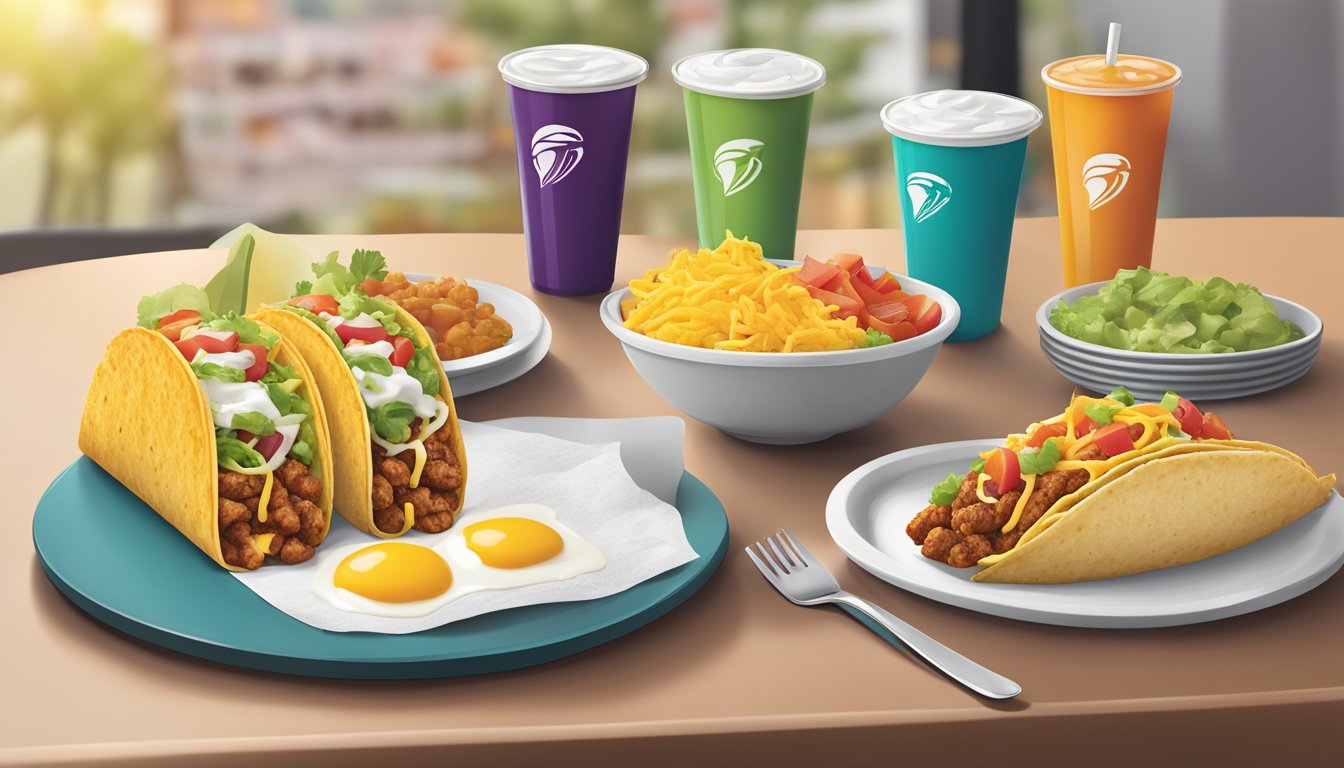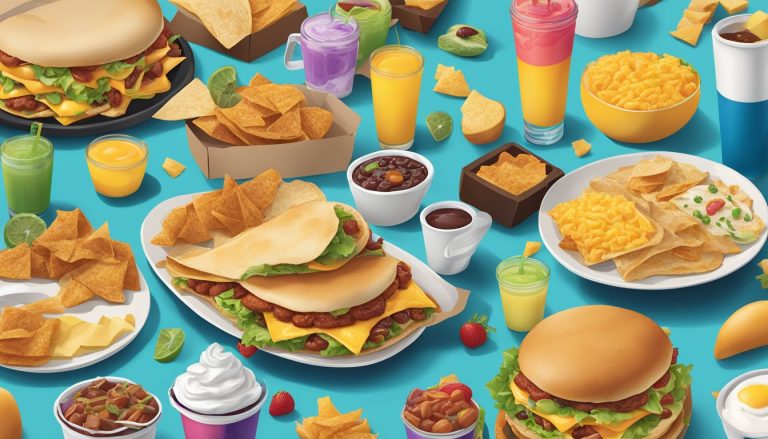Taco Bell’s breakfast menu offers a variety of options for those seeking a quick morning meal. While fast food is often associated with unhealthy choices, there are some surprisingly nutritious selections available.
Dietitians have identified several breakfast items at Taco Bell that can fit into a balanced diet. These choices provide a mix of protein, carbohydrates, and fats, helping customers start their day with a satisfying meal that aligns with their nutritional goals. By making informed decisions, diners can enjoy the convenience of fast food without sacrificing their health objectives.
1) Breakfast Crunchwrap (Bacon)
The Breakfast Crunchwrap with bacon is a popular item on Taco Bell’s morning menu. This hexagonal-shaped handheld meal combines several breakfast favorites into one convenient package.
The Crunchwrap contains eggs, bacon, cheese, and a hash brown, all wrapped in a grilled flour tortilla. It provides a satisfying mix of flavors and textures in each bite.
Nutritionally, the Breakfast Crunchwrap with bacon contains 670 calories. It has 51 grams of carbohydrates, 42 grams of fat, and 4 grams of dietary fiber.
The sodium content is notable at 1300 milligrams, which is 54% of the recommended daily value. The Crunchwrap also provides 12 grams of saturated fat, which is 60% of the daily recommended amount.
While not the lightest breakfast option, the Crunchwrap offers a balance of protein, carbs, and fats. It can be a filling choice for those seeking a hearty breakfast on-the-go.
2) Cheesy Toasted Breakfast Burrito
The Cheesy Toasted Breakfast Burrito is a popular choice on Taco Bell’s morning menu. It comes in several varieties, including sausage and bacon options.
This breakfast item offers a convenient on-the-go meal for those busy mornings. The burrito combines fluffy eggs, melted cheese, and a choice of meat wrapped in a warm flour tortilla.
Nutritionally, the Cheesy Toasted Breakfast Burrito ranges from 340 to 350 calories, depending on the meat selection. The sausage version contains 340 calories, while the bacon option has 350 calories.
The burrito provides a balance of macronutrients. It contains carbohydrates from the tortilla, protein from the eggs and meat, and fats from the cheese and meat.
Sodium content is a consideration, with the bacon version containing 880 mg. Those watching their salt intake may want to be mindful of this.
For those seeking a protein boost to start their day, this burrito offers 13 grams of protein. This can help provide sustained energy throughout the morning.
3) Grande Toasted Breakfast Burrito (Steak)
The Grande Toasted Breakfast Burrito with steak is a hearty option on Taco Bell’s breakfast menu. It contains 560 calories, making it a substantial meal to start the day.
This burrito is packed with a variety of ingredients. It includes steak, double the eggs, potato bites, tomatoes, and three types of melted cheese. The combination is toasted to perfection, creating a satisfying texture.
The calorie breakdown shows that 45% of the calories come from fat, while 36% come from carbohydrates. The burrito contains 50 grams of carbs and 28 grams of fat.
For those tracking their calorie intake, it’s worth noting that burning off the 560 calories in this burrito would require about 49 minutes of running or 80 minutes of walking.
While the Grande Toasted Breakfast Burrito (Steak) offers a good amount of protein, it’s also high in calories and fat. Nutritionists might recommend this option for those with higher calorie needs or as an occasional treat.
4) Hash Brown Toasted Breakfast Burrito
The Hash Brown Toasted Breakfast Burrito is a popular item on Taco Bell’s morning menu. This hearty option combines savory breakfast flavors with the restaurant’s signature Tex-Mex style.
The burrito contains a flour tortilla filled with scrambled eggs, bacon or sausage, cheese, and a crispy hash brown. It’s then toasted to give the exterior a pleasant crunch.
Nutritionally, this burrito packs a significant caloric punch. It contains approximately 570 calories, making it one of the more substantial breakfast choices at Taco Bell.
The burrito provides 30-34 grams of fat and 18-24 grams of protein. These macronutrients contribute to its filling nature, potentially keeping hunger at bay throughout the morning.
Customers can choose between bacon and sausage versions of this burrito. Both options offer similar nutritional profiles, with slight variations in fat and protein content.
While tasty, this burrito is relatively high in calories and fat. Those watching their intake might consider it an occasional treat rather than a daily breakfast option.
5) Sausage Flatbread Quesadilla

The Sausage Flatbread Quesadilla is a popular breakfast option at Taco Bell. It contains 330 calories, making it a moderate calorie choice for those watching their intake.
This breakfast item provides 14 grams of protein, which can help keep diners feeling satisfied throughout the morning. It also contains 27 grams of carbohydrates, offering energy to start the day.
The quesadilla contains 18 grams of total fat, including 6 grams of saturated fat. While this is a significant portion of recommended daily fat intake, it can still fit into a balanced diet when consumed in moderation.
Sodium content is an important consideration, with 520 mg per serving. This represents about 22% of the recommended daily intake for most adults.
For those looking to add some fiber to their breakfast, the Sausage Flatbread Quesadilla offers 2 grams. While not a high-fiber option, it contributes to daily fiber needs.
Benefits of Eating Breakfast

Eating breakfast provides numerous advantages for overall health and daily functioning. A nutritious morning meal sets the stage for improved physical and mental performance throughout the day.
Enhanced Metabolism
Consuming breakfast jumpstarts the body’s metabolism after the overnight fasting period. This metabolic boost helps burn calories more efficiently throughout the day. A balanced breakfast that includes protein, complex carbohydrates, and healthy fats can provide sustained energy.
Eating in the morning also helps regulate blood sugar levels, reducing cravings and overeating later in the day. Studies have shown that regular breakfast eaters tend to maintain a healthier weight compared to those who skip this meal.
Improved Concentration
A nutritious breakfast fuels the brain, enhancing cognitive function and mental clarity. Essential nutrients from a morning meal support memory, focus, and problem-solving abilities.
Children and adults who eat breakfast often perform better in school and work tasks. They demonstrate improved attention spans and information retention. Skipping breakfast can lead to decreased productivity and difficulty concentrating.
Eating in the morning also helps stabilize mood and reduce irritability. This emotional balance contributes to better decision-making and interpersonal interactions throughout the day.
Nutritional Insights into Fast-Food Breakfasts
Fast-food breakfast options can vary widely in their nutritional content. Key factors to consider include macronutrient balance and calorie counts.
Balancing Macronutrients
Protein, carbohydrates, and fats form the macronutrient trio essential for a balanced breakfast. Many fast-food breakfast items lean heavily on carbohydrates and fats, often lacking adequate protein.
Egg-based options tend to offer better protein content. For example, egg white sandwiches can provide a lean protein source.
Whole grain choices, when available, contribute beneficial fiber and complex carbohydrates. These options help maintain steady blood sugar levels throughout the morning.
Healthy fats from ingredients like avocado or nuts can enhance satiety. However, many fast-food breakfast items contain excessive saturated fats from cheese, meats, and fried components.
Understanding Caloric Content
Calorie counts in fast-food breakfast items can range significantly. Some options may contain over 500 calories, while others stay under 300.
Higher calorie items often include multiple ingredients like biscuits, bacon, cheese, and sauces. These can quickly add up, potentially exceeding recommended calorie intake for a single meal.
Lower calorie choices typically feature simpler ingredients and smaller portions. Egg white-based sandwiches on English muffins or wraps tend to fall into this category.
Customization can help manage calorie intake. Removing high-calorie toppings or opting for smaller sizes can make a substantial difference.
Beverages also contribute to overall calorie count. Choosing water, unsweetened coffee, or tea instead of sugary drinks can significantly reduce total breakfast calories.




